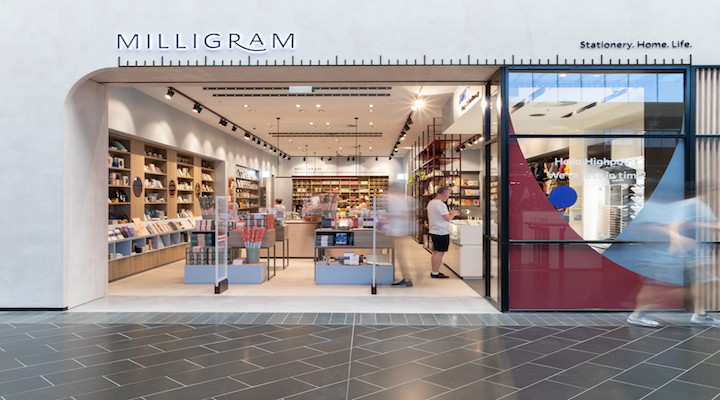Telegram Co co-founder and chief executive Scott Druce believes the company, which specialises in stationery and lifestyle products, owns retail chain Milligram, is in a strong growth phase. Milligram is launching its sixth store in Melbourne, on Bourke Street, next week, as part of a five-year strategic plan, which will see more store openings in major cities across Australia. Noting that the new Milligram store – designed with Melbourne-based company Studio.Y – is in a high-exp
gh-exposure location, Druce anticipates that Telegram Co’s revenue will increase by over 50 per cent over the next three years.
“It’s a bit of a cliché, but we wanted to do something that was fresh and colourful, almost as a response to the pandemic and what the Melbourne CBD went through,” Druce told Inside Retail about the look and feel of the new store.
“We’ve seen a lot of people reconnecting in the CBD, so we wanted to create an open, bright, vibrant store that stocks a lot of Melbourne products as part of that CBD recovery.”
The new shop will feature products from its in-house brand, Studio Milligram, as well as a range of partner brands, including Bellroy, Migoals and Orbitkey.
Telegram Co is also looking to expand its retail footprint in Sydney, Canberra, Brisbane and Adelaide in the future.
“The question we’re asked most is, ‘Where is your Sydney store?’ Followed by, ‘Where is your Brisbane store?’” Druce said. “There’s definitely an appetite to have a physical store presence in most states. It just depends on what comes up.”
Products with purpose
Starting with two people working at a dining room table, Telegram Co now represents about 30 brands and wholesales across Australia and New Zealand. Druce explains that its ethos is centred around products with purpose.
“We’re not interested in frivolous, decor sort of products. Rather, we’re interested in functional tools that [customers] will use each day, and keep for a long time. We avoid disposable products, and work with companies – some that have been manufacturing for over 100 years – that are experts in what they make,” he said.
“We sell products that have value beyond the initial purchase. As a lot of our products are reusable – [our] largest group of customers are Gen Y and Gen Z. Even though they are digital natives, they are making a conscious choice to use these products, [so we] want really good products in this space.”
Milligram’s online and retail presence are joined at the hip, with customers researching online before coming in and benefiting from the store’s customer service and knowledge base.
“Everyone talks omnichannel, but customers shop online and in-store,” Druce said.
“Online continues to be our biggest [presence, but] physical retail is definitely growing for us, and will be a big source of revenue over the next few years.
“Each store is really important from a revenue perspective, as well as a brand and visibility perspective.”
Shaking the Covid-19 fog
Druce foresees a strong period of growth for the business following the last two, pandemic-affected years.
The online side of the business was successful while Milligram’s Melbourne stores were shut. This was partly due to Telegram Co’s multi-channel approach, and its ability to quickly shift focus as customers worked from home.
But Druce has recently seen creativity and innovation in its product development team, adding that its Christmas launch was particularly strong, and it had its best-ever Father’s Day result this year.
“As a business, the pandemic was hard in many ways. You look back on it now, and we’re still recovering from what we went through, especially as a Melbourne-based company. But it’s great to see people shake off that Covid-19 fog,” Druce said.
“We’re seeing sustainability, fresh design and rethinking come through [as] we come out of that dark period.”
Amid rising cost of living pressures, Druce believes that the brand needs to provides value, and explain that value to customers.
“Even though a writing instrument might cost $20 compared to one that costs $10, ours are refillable. Those refills have a sustainable element, but they are also more economical over time,” he said.
“So we’re ensuring that we still provide good quality products, with strong and honest components, at an accessible price [while] continuing to work on products that give more value.”

